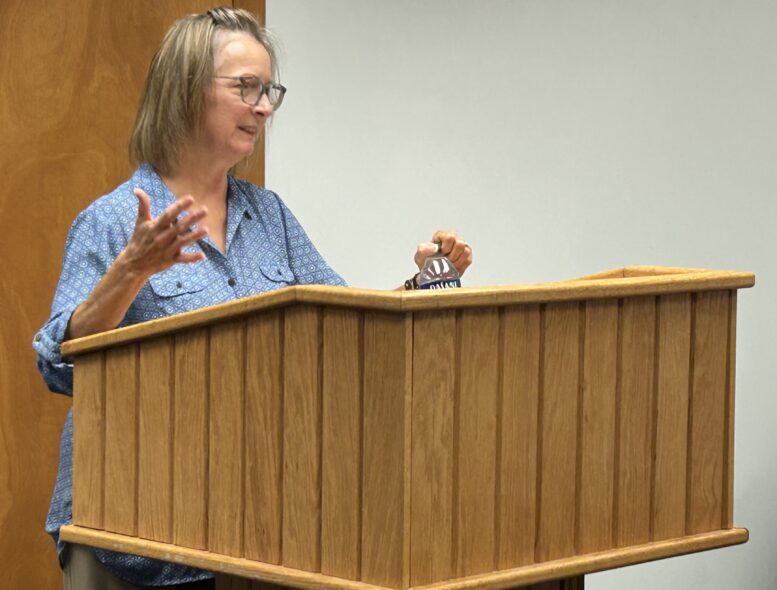By DAVID DUPONT
BG Independent News
The Wood County Board of Elections today (Aug. 20) rejected a request by a Lake Township resident to remove 111 names from the voter rolls.
This was the second time this summer Taina Romstadt has come to the board requesting that voters who have apparently moved from the county be taken off the registration list.
The board said that all the names presented are already going the the process, which is spelled out by state statute.
There is no indication that any of these people have or attempted to vote in Wood County recently.
Romstadt, however, maintains that the board has the authority to take more immediate action and not wait for the process which can take four years to play out.
Romstadt first approached the board in June with 103 names. A hearing was held on June 28 with the board declining to remove the names. Eight of them however have been removed through the “status process.”
Under that process voters whom the Board of Elections suspects have moved and have not voted are sent notices. They can reply on their status, or if they do not vote in the next two federal elections (a four-year period), they are dropped from the rolls, said Douglas Ruck, the commissioner who led Tuesday’s hearing.
On Tuesday Romstadt presented 112 names.
On further examination, one of those voters had contacted the Board of Elections to inform them he now lived in Michigan. Of the remaining 111, 95 were the same as Romstadt presented in June. She resubmitted them, she said, to provide additional information in hopes the commission would now act on them.
While praising Romstadt for “doing her homework,” Ruck said the documentation was not admissible consisting of screen grabs of government sites or databases maintained by non-governmental authority.
Those sources did not include social security numbers nor birthdates that would clearly identify an individual.
Romstadt said based on the documentation she provided it was clear that these people had moved and had voted elsewhere in elections.
She said that state law required the commission to investigate those claims.
Ruck said that the law she referred to was a statute spelling out in general terms the duties of the commission, and that more specific guidance was provided in a later statute.
Following links from the hundreds of pages of documents she presented would provide the information they needed, Romstadt said. The board was shirking its responsibilities by not doing the research.
Romstadt took up this mission after the 2020 Presidential election when she said “I became very concerned about election integrity.” She devoted herself to seeking out information and “trying to weed out what was real and what was not real.”
Romstadt said she learned there were “serious problems with voter roles around the country including Ohio. “So I remained concerned.” So she did the work to bring these challenges.
She said based on what she found, the commission should at least conduct its own investigation.
Ruck noted that under the law, she has the burden of proof in what was described as a quasi-judicial procedure including the presence of a court reporter.
Ruck said that the law clearly states someone moving is not sufficient to remove them from voting rolls. “We don’t want to disenfranchise anyone from their right,” he said. “Any policy with no guidelines could be abused other places.”
Romstadt said at least two counties Perry and Licking have addressed this issue differently. “The board,” she said, “has some discretion.” Investigating based on what she provided is just “common sense.”
Ruck said the Board of Elections is acting by using the confirmation status process.
Andrew Newlove moved that the challenges be denied. It passed unanimously.

